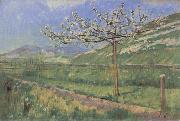
Oil On
Canvas, Real Flavor of Old Masters
|
Ferdinand Hodler
|
|||
|
|
|||
| 1853-1918 Swiss Ferdinand Hodler Galleries Hodler was born in Berne and grew up in poverty. His father, Jean Hodler, made a meager living as a carpenter; his mother, Marguerite (n??e Neukomm), was from a peasant family. By the time Hodler was eight years old, he had lost his father and two younger brothers to tuberculosis. His mother remarried to a decorative painter, but in 1867 she too died of tuberculosis. Before he was ten, Hodler received training in decorative painting from his stepfather, and was subsequently sent to Thun to apprentice with a local painter, Ferdinand Sommer. Hodler's earliest works were conventional landscapes, which he sold in shops and to tourists. In 1871, at the age of 18, he traveled on foot to Geneva to start a career as a painter. The works of Hodler's early maturity consisted of landscapes, figure compositions and portraits, treated with a vigorous realism. He made a trip to Basel in 1875, where he studied the paintings of Hans Holbein??especially Dead Christ in the Tomb, which influenced Hodler's many treatments of the theme of death. In the last decade of the 19th century his work evolved to combine influences from several genres including symbolism and art nouveau. He developed a style which he called Parallelism, characterized by groupings of figures symmetrically arranged in poses suggesting ritual or dance. In 1884 Hodler met Augustine Dupin (1852?C1909), who became his companion and model for the next several years. Their son, Hector Hodler, was born in 1887. In 1889 Hodler married Bertha Stucki; they were divorced in 1891. Hodler's work in his final phase took on an expressionist aspect with strongly coloured and geometrical figures. Landscapes were pared down to essentials, sometimes consisting of a jagged wedge of land between water and sky. However, the most famous of Hodler's paintings portray scenes in which characters are engaged in everyday activities, such as the famous woodcutter (Der Holzfaller, Mus??e d'Orsay, Paris). This picture went on to appear on the back of the 50 Swiss Franc bank note issued by the Swiss National Bank. In 1898, Hodler married Berthe Jacques. In 1914 he condemned the German atrocities conducted using artillery at Rheims. In retaliation for this, German art museums excluded Hodler's work. In 1908 he met Valentine Gode-Darel, who became his mistress. She was diagnosed with cancer in 1913, and the many hours Hodler spent by her bedside resulted in a remarkable series of paintings documenting her disintegration. Her death in January 1915 affected Hodler greatly. He occupied himself with work; a series of about 20 introspective self-portraits date from 1916. By late 1917 his declining health led him to thoughts of suicide. He died on May 19, 1918 in Geneva leaving behind a number of unfinished works portraying the city. | |||
|
|
|||
|
|
Apple tree in Blossom new19/Ferdinand Hodler-458267.jpg Painting ID:: 54303 Visit European Gallery |
mk235 c.1890 Oil on canvas 26.5x40cm | |
Height Width |
INS/CM |
||
|
X |
|
||
|
|
|||







